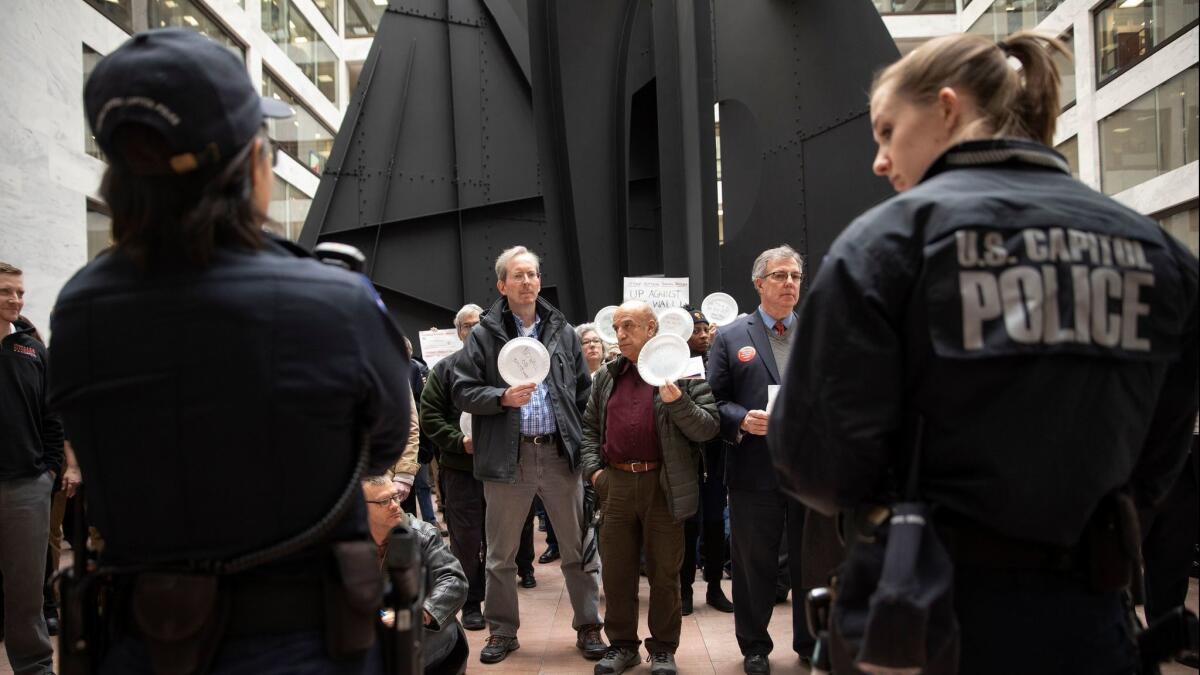Editorial: There’s a word for forcing people to work for untold weeks without paying them

- Share via
The longest government shutdown in history is almost certain to extend into its 35th day Friday, denying some 800,000 full-time federal workers their second consecutive paycheck. It’s just a partial shutdown — nine out of 15 government departments and dozens of agencies are affected, representing about 44% of the federal workforce — but these employees will have endured nearly a month without their main source of income. That’s not counting half a million or more federal contractors whose work has also been cut off by the shutdown.
It’s shameful enough that hundreds of federal workers are reduced to lining up for free meals and other handouts, seeking temporary relief on their mortgages and asking for more time to pay their bills. What’s worse is that about 420,000 of them have been required to keep working throughout the shutdown, even though they’re not being paid, because their jobs are deemed “essential.” These include Border Patrol, Coast Guard and Transportation Security Administration employees who are defending the United States from the very threats that prompted President Trump to shut down the government in the first place. Forcing “essential” workers to stay on the job makes a shutdown considerably less painful — and dangerous — for the general public, removing much of the urgency to strike a deal.
Yes, Congress has assured all these workers that they will eventually be paid the wages they didn’t collect during the shutdown. But in the meantime, forcing people to work without pay week after week becomes hard to distinguish from slavery. And the money they’re not collecting is money they’re not spending, either, which is dragging down the overall economy. (And we’re not even focusing here on how the shutdown is affecting the general public, including diminished or canceled federal services, closed federal parks, museums and other facilities, cutbacks in environmental enforcement efforts and some food inspections, and potentially an interruption in food stamp benefits.)
Forcing people to work without pay week after week becomes hard to distinguish from slavery.
You might think that the increasing desperation of federal workers and the mounting damage to the economy would prompt Congress and the president to engage in the sort of intense negotiations that ended the bitter teacher strike at Los Angeles Unified School District after six days. But we’ve seen no such thing in Washington, where Trump and House Speaker Nancy Pelosi (D-San Francisco) have traded childish potshots over the State of the Union address instead of trading real proposals for ending the shutdown.
The posturing reached an apex Wednesday, when Trump told Pelosi that he planned to give his speech in the House chamber on schedule Tuesday and Pelosi effectively revoked his invitation to do so until the shutdown ended. Trump then asserted to reporters that Pelosi “doesn’t want to hear the truth and ... more importantly, the American people to hear the truth,” as if that’s what he would have delivered.
Let’s be clear here. The president caused the shutdown by demanding $5.7 billion for a wasteful and ineffective wall along the southern border. He’s extending the shutdown by sticking stubbornly to that demand as a precondition for reopening the government. Democrats, meanwhile, are refusing to negotiate over border security issues while the government is shut down — and rightly so. If they cave in to the president because he took much of the government hostage, it will set a horrible precedent.
Enter the Fray: First takes on the news of the minute »
For their part, House Democrats have pushed multiple bills through their chamber to reopen the government, including another one Wednesday (which six Republicans voted for as well). They are also reportedly preparing to offer Trump a list of border-security improvements other than a wall that they would support once he agreed to end the shutdown. The GOP-controlled Senate, meanwhile, finally plans to get off the sidelines Thursday, taking up two bills to end the shutdown that are likely to fail. It’s a largely symbolic exercise, but it’s a start.
Perhaps public opinion will light a fire under our approval-craving president. More than half of those surveyed recently by the Pew Research Center said they don’t support Trump’s wall ambitions, and a steadily growing majority of Americans in a variety of polls say they disapprove of Trump’s performance in office.
Nevertheless, the administration appears to be digging in for the long haul on the shutdown, suggesting that Trump believes he can wear Democrats down. The real victims, though, are federal workers and those of us who are served by them. It’s appalling that the shutdown has lasted so many weeks; it’s even more appalling that the president seems content to let it drag out even longer.
Follow the Opinion section on Twitter @latimesopinion and Facebook
More to Read
A cure for the common opinion
Get thought-provoking perspectives with our weekly newsletter.
You may occasionally receive promotional content from the Los Angeles Times.






